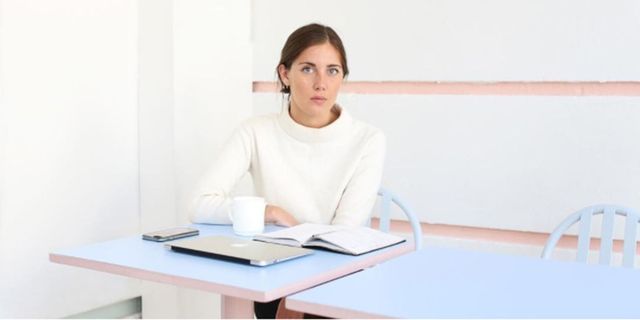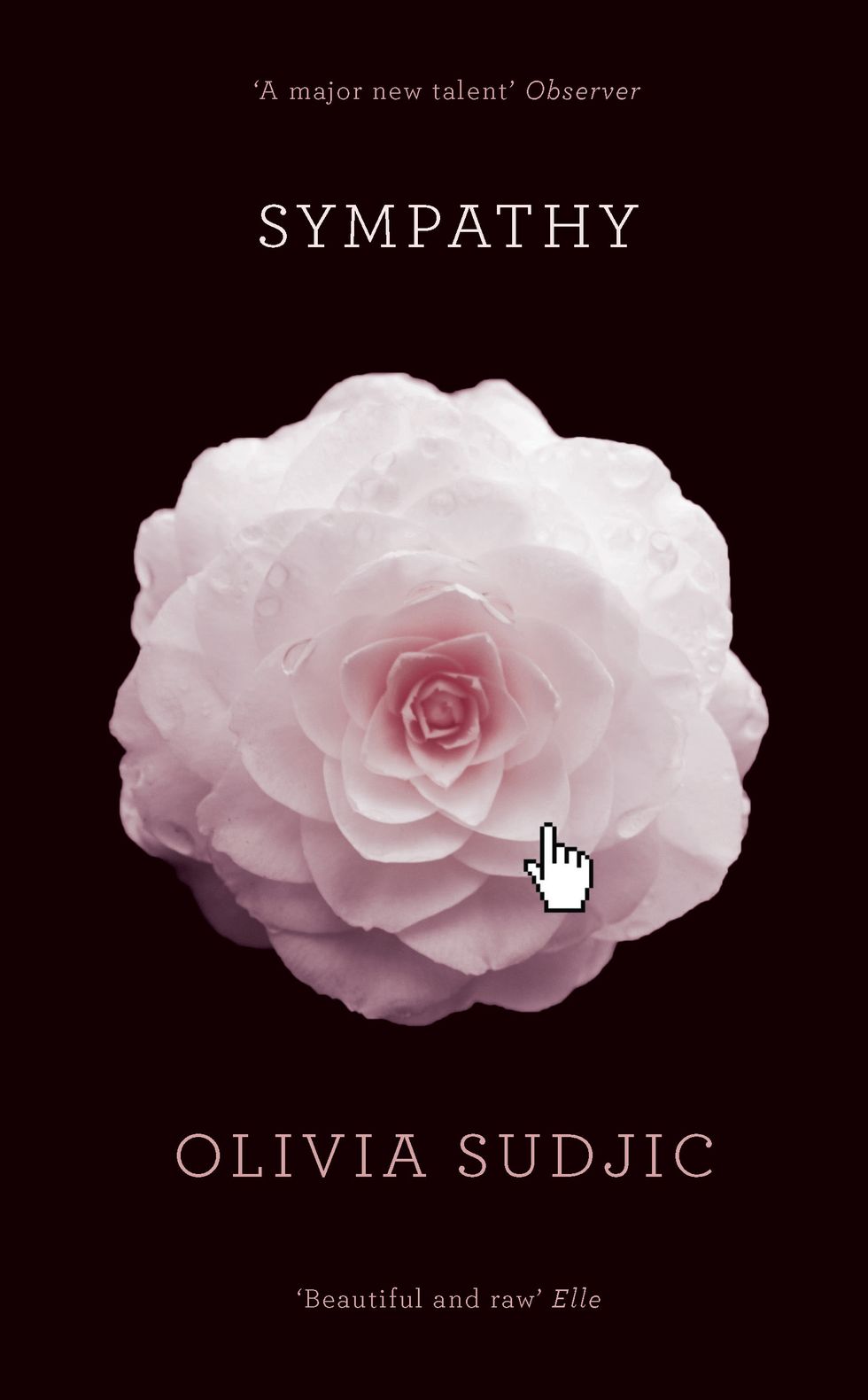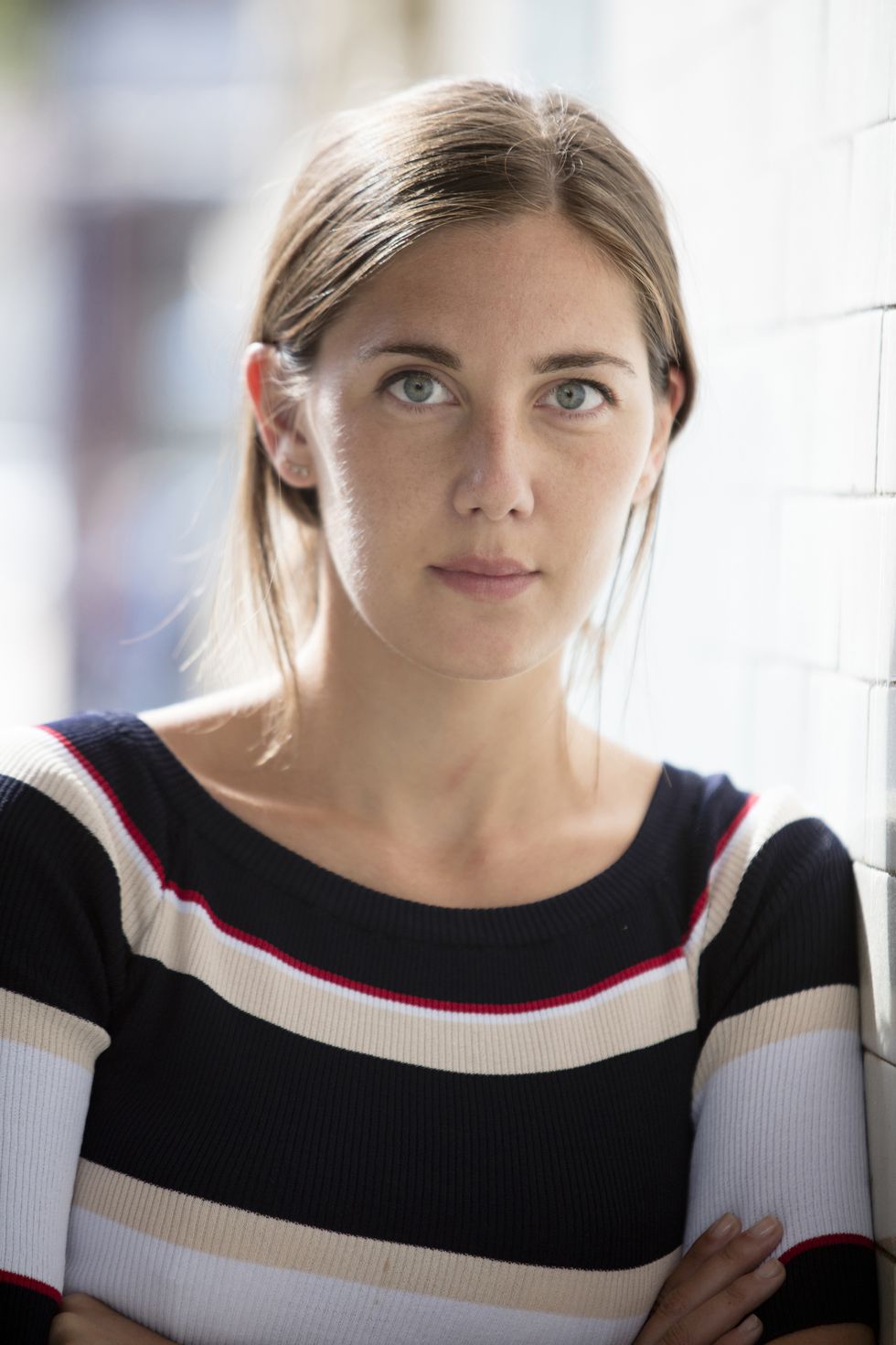I was surprised to find Olivia Sudjic on Instagram.
The 28-year-old is something of a self-proclaimed 'tin-hat wearer' when it comes to social media. Her official 'author' page was easy enough to track down (it's public). But a few clicks into one particularly late-night social media crawl (don't judge, guys) and my blue-glowing screen lights up with her private, personal profile.
I tapped, watching the white box turn grey and awaited her response. 'Follow' transformed into 'Requested' and I paused, briefly, before returning to my home screen.
It was then I recalled the opening chapter of Sudjic's novel Sympathy. The speaker agonises over an almost identical scenario:
Follow, once white, was now an arresting grey, the word replaced by Requested. I felt this new word did not convey proper urgency. For a start, I did not like the past tense. I glared at the word as I lay in bed, certain that my envoy was not requesting hard enough.
We've all been there, right? Which makes Sudjic's debut novel - and first foray into creative writing since school - all the more timely. The plot follows Alice (nicknamed Rabbit) Hare (the Carroll reference and Updike dig are intentional) fall in something-like-love with a writer, slightly older than herself, over Instagram and orchestrates a not-so chance meeting.
And there I was, having found a (slightly older) writer over Instagram, sending the elusive follow request, hoping to orchestrate a meeting myself.
Whilst I am yet to become so enthralled with an account I choreograph a run-in using their location tag, the deep sensation of knowing someone through their Instagram page is familiar; the desire to meet and make real the digital relationship you tend to is tangible.
And that's the real kicker about Sympathy; the book is geo-located to your reality circa 2014, firmly rooted somewhere around the Ice Bucket Challenge and guiltily stuck in your throat like a two-hour Instagram hole. You can see why it's being hailed as the first great Instagram novel.
Don't worry, this isn't a two-dimensional lecture proclaiming the ills of the social media age. It's more an exploration of our uniquely connected era, asking one (admittedly, complicated) question: 'Do we know what we're getting ourselves into?'
A notification: oliviasudjic (Olivia Sudjic's personal handle) had accepted my request to follow her. A quick scout around her Twitter had also bore fruit in the form of an agent's email. The meeting was set. I placed down my phone and switched it for Sympathy.
One week later, 28-year-old Sudjic and I are nursing caffeine together, discussing how she has come to become the go-to millennial rent-a-voice for all things social media, tech and well, millennial.
Considering the novel's onus on privacy, how have you found the public interest in you personally since the book's release?
I'm happy to write about personal things, but I'm not willing to throw people around me under the bus.
Otherwise I feel as though I'm falling into exactly the same trap as in the book. Where you let all this stuff out into the world and you have no idea how random trolls will take it.
I have become a lot more cautious - there's a reason why I have two Instagram accounts. Otherwise I would have had to go backwards and sanitise everything.
Do you think sexism is at play when it comes to female artist's personal life and their work?
It's a distraction. It's something men don't have to deal with as much as women. A man can write the most personal-sounding story that completely overlaps on their life and it's about the universe, but when a woman writes about the universe, everyone thinks it's really about her.
You have said that the internet reflects, or is in fact just an extension, of the world and therefore is an inherently patriarchal structure. That being said, do you think that the internet can be used to dismantle that?
Well, if we get more female coders then maybe.
I feel like the internet is where we were in the workplace 50 years ago. It's so male-dominated. They're not marginalized. They're not a black, gay, transgender person who's experiencing any form of cyberbullying.
For example, Facebook used to label videos of rape as 'controversial' and the mechanisms for reporting sexual abuse received online was that you had to report each incident separately.
That puts the burden on some woman to report each case and it's dealt with as though each one is just one individual incidence.
Do you think there is hope for the big bad internet?
We have got the web now but we need to build the web that we actually want.
With the internet, it reminds me of that scene in Green Wing where she's always getting the sexy computer IT guy to come and help fix her computer. She's like: 'I can't, my computers frozen'.
I just feel a bit like we're all saying 'call the IT guy or let the people in Palo Alto sort it out, they know what they're doing'.
You're young, a woman and have just written very a zeitgeisty book - is it weird answering all these questions on the ethics of the internet?
To quote Lena Dunham, 'I'm a voice of a generation.'
I'm millennial clickbait. Click me. [laughing]
It does feel, though, like there's a strong shift in how we see things. People are thinking about choice and information a lot.
With Brexit and Trump people are finally like: 'wait a second, what is under this internet of which we speak?'
Did you know the internet can not show flats or apartments for rent to people the internet identifies as black?
They like Beyoncé on Facebook and a certain type of rap music and they've eaten friend chicken a certain number of times.
It's illegal but it's so unregulated the legality does not extend from the real world.
People think the internet is a fantasy digital crèche in which you can act out any desire and play a second life and it's not real, whereas our generation is much more in tune to the fact that those two worlds are essentially the same and there isn't really much distinction anymore.
Alice, the book's protagonist, thinks some truly terrible things - there's a hilarious scene where she goes to a talk about the Holocaust with her online crush and the entire time she is thinking completely about herself.
I was worried my editor would read it that scene and just think I was a terrible person.
But then I realised, my favourite types of books, TV shows and films have quite terrible people in them.
Luckily my US editor was both Jewish and amused, so it was fine.
But I love Fleabag for that reason. The best scene is when you discover that the person who has been leading you along the whole time is actually the villain of the piece, but you're complicit.
I definitely see the links to Chris Kraus' I Love Dick. Both books are almost epistolary and an exploration of female abjection. They suggest that love and obsession can be an act of endurance art.
I thought of Alice doing some strange performance art like Marina Abramovic, but then when I read I Love Dick I realised Alice could be completely offering herself through text messages.
The idea that the only way to regain some sense of dignity after being ignored is to turn it into art. Men don't really have to encounter shame in the same way as women.
The reality is sometimes I feel proud and other times I feel deeply ashamed. That's my daily experience of life.
Sympathy is available now from Pushkin Press.
Daisy Murray is the Digital Fashion Editor at ELLE UK, spotlighting emerging designers, sustainable shopping, and celebrity style. Since joining in 2016 as an editorial intern, Daisy has run the gamut of fashion journalism - interviewing Molly Goddard backstage at London Fashion Week, investigating the power of androgynous dressing and celebrating the joys of vintage shopping.















